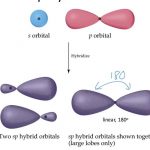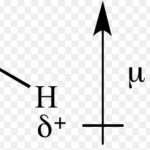Hybridisation is defined as the mixing of the atomic orbitals belonging to the same atom but having slightly different energies so that a redistribution of energy takes place between them resulting in the formation of new orbitals of equal energies and identical shape. The new orbitals thus formed are known as hybrid orbitals. Important points about hybridisation … [Read more...] about Hybridisation
Class 11
Fajan’s Rules
When a cation approaches an anion, the electron cloud of the anion is attracted towards a cation and hence gets distorted. The effect is called polarisation of the anion. The power of cation to polarise anion is called its polarising power and tendency of the anion to get polarised is called polarisability. The greater is the polarisation produced, more is the neutralisation … [Read more...] about Fajan’s Rules
Dipole Moments
In a polar molecule, there are two poles present in the molecule. Hence, the molecule is said to possess an electric dipole. Since the molecule as a whole is electrically neutral ,the negative charges is always equal in magnitude to the positive charge. The product of magnitude of negative or positive charge(q) and the distance between the centres of the positive and … [Read more...] about Dipole Moments
Polar and Non-Polar Covalent Bond
Non-polar covalent bonds If two similar atoms come close to each other and form a bond by sharing their electrons, the shared electrons are equally attracted by the two atoms as the electronegativity of the atoms is same. Hence no poles are developed. This leads to the formation of completely non-polar bonds. If two hydrogen atoms form a bond, the electron pair will … [Read more...] about Polar and Non-Polar Covalent Bond
Bond Characteristics
Bond Length When atoms come closer to each other, attraction takes place between them and ,therefore, the potential energy of the system keeps on decreasing till at a particular distance, the potential energy is minimum. If the atoms are further brought closer ,the repulsion start and therefore, the potential energy of the system begins to increase. At equilibrium … [Read more...] about Bond Characteristics


